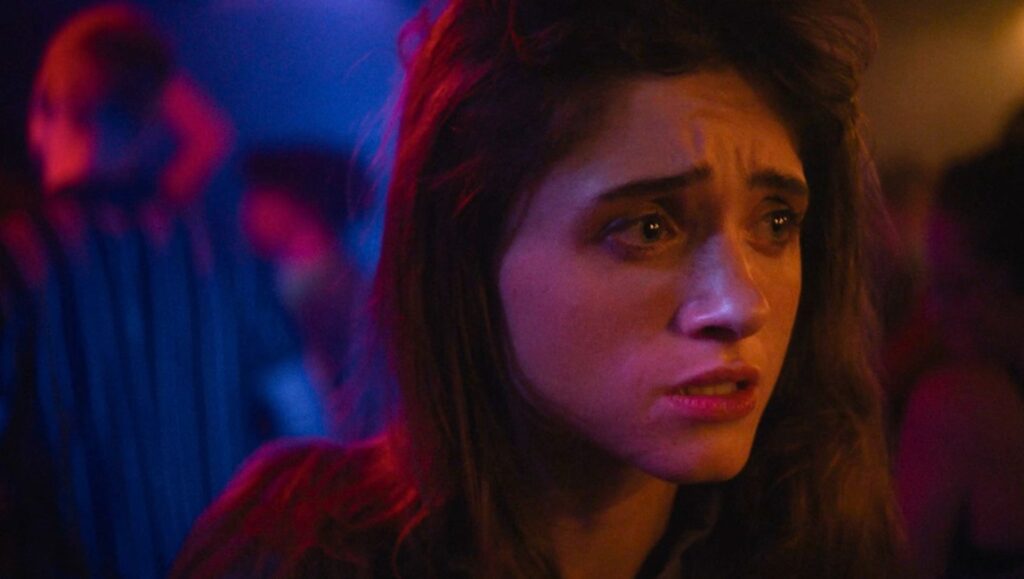It’s an awkward phase, that post-graduation purgatory where possibilities seem endless, endlessly limited, or both — or so I’m told, I never went to college myself — and the choice paralysis and more general anxiety that so often comes with navigating it provides a fairly convenient backdrop for filmmakers of a certain age to explore a whole host of different themes. Such is the case with director Jac Cron, whose debut, Chestnut, purports to take an honest, intimate look at what being directionless — perhaps even in love — in your twenties looks like.
If the proliferation of the term “situationship” is anything to go on, dating as a twenty-something is even more of a confusing mess in the 2020s than it was in the decades that preceded it. And if Cron’s film is anything to go on, the confusion isn’t even made worthwhile through (at least momentarily) satisfying sex. No, when Annie (Natalia Dyer), a recent college grad living in Philly until her new job takes her to L.A., finds herself entangled in a slightly awkward and agonizingly platonic three-way situationship with Tyler (Rachel Keller) and Danny (Chella Man), there is a lot of talking, some drunken making out… but no sex.
Annie, mainly smitten with the charismatic Tyler, at one point floats the idea of her new not-girlfriend moving to Los Angeles with her, but this irrationality isn’t an outgrowth of any kind of uncontrollable desire and is instead the product of rather juvenile notions of love on Annie’s part, as well as a careless lack of communication from the emotionally unavailable Tyler. Later, Annie contemplates postponing her West Coast ambitions, so consumed is she. But consumed by what exactly? Cron gets at some of the insecurities and overarching feelings of repression that color the romantic lives of many young people today. However, she couples this with a kind of recklessness that doesn’t feel at home in the emotional world the film occupies. Rash decisions, premature declarations of love, even drug use — though not consumed in excess, of course — and yet none of it carries over into the realm of the physical.
Things actually feel quite lived in at first: stolen glances, playful conversations used to suss out a possible romantic dynamic, clumsy three- or four-way interactions regarding who gets to leave with whom; it’s all suggestive of something very true of life at that stage. Unfortunately, one wishes the film wasn’t so well-behaved and would allow for these relationships to develop into something more profound, something more deeply felt — something passionate, something truly messy. There is no libidinal surge to the conflicts, no jealousy fueled by unhealthy obsession or possessiveness. Everything comes in moderation, not just the consumption of narcotics.
In keeping in line with contemporary trends, Cron stops short of allowing her voice to come through, and as a result her characters are more defined by absence than presence. At one point Annie asks a woman she meets at a bar what kind of writing she does. “Fiction mostly,” the woman responds. “I don’t really like the real world.” (Curious how much exchanges like these recall the ones in the works of Irish author Sally Rooney, a writer who, according to novelist Stephen Marche, exemplifies what he termed “Literature of the Pose.”) Absence marks the central trio’s would-be love triangle too. When being accused of having sex with Tyler behind Annie’s back, Danny makes sure to set the record straight: “We don’t do that.” The film keeps the truth somewhat ambiguous, but it’s tempting to take him at his word — it appears that nobody is doing “that.”
The other relationships here are hardly noteworthy, aside from Annie’s phantom of a father who exists only at the other end of a telephone, quick to console his emotionally confused daughter with teddy-bear platitudes and therapy-speak emotional openness. Contrast Chestnut with a film like Hadas Ben Aroya’s All Eyes Off Me and the deficits become even more apparent. That film’s willingness to explore the emotional as well as the physical turmoil these ill-defined entanglements can bring with them made its fleeting moments of realization, clarity, and intimacy all the more powerful. In Chestnut, they feel more like a foregone conclusion.
DIRECTOR: Jac Cron; CAST: Natalia Dyer, Rachel Keller, Danny Ramirez, Chella Man; DISTRIBUTOR: Utopia; IN THEATERS: June 21; STREAMING: July 2; RUNTIME: ddd


Comments are closed.